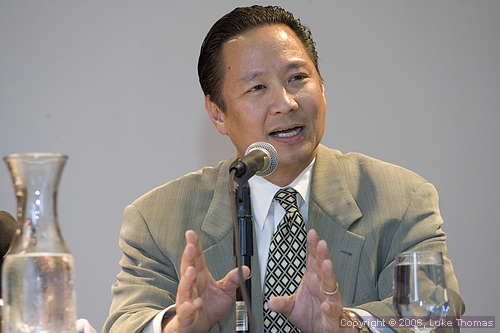Study questions effectiveness of gang injunctions

San Francisco Public Defender Jeff Adachi
Photo(s) by
Luke Thomas
From the Office of San Francisco Public Defender
Jeff Adachi
July 18, 2007
A groundbreaking new report released today by the
Justice Policy Institute argues that the billions of dollars spent
on traditional gang suppression activities, which include the
enforcement of gang injunctions, have failed to promote public
safety and are often counterproductive. The report is released
less than a week after City Attorney Dennis Herrera appeared in
court to
seek permanent injunctions against 76 Mission and Western
Addition residents alleged to be gang members.
Gang Wars: The Failure of Enforcement Tactics and the Need for
Effective Public Safety Strategies, written by Judith Greene and
Kevin Pranis, undertakes an extensive review of the research literature
on gangs to clarify persistent misconceptions and examine the
effectiveness of common gang control strategies. According to
the report, in cities like Los Angeles where gang activity is
most prevalent, more police, more prisons and more punitive measures
haven't stopped the cycle of gang violence.
The report describes civil gang injunctions as legal tools "designed
to enhance targeted suppression efforts." According to the
report, while "[l]aw enforcement and the media report impressive
reductions in crime and fear through the use of gang injunctions…
these stories are never buttressed with supporting evidence that
meets minimal scientific standards of evaluation."
The City of San Francisco has already secured a permanent injunction
in the Bayview-Hunter's Point District. However, according to
Public Defender Jeff Adachi, "Bayview Hunters Point is no
less of a war zone than it was last year when the gang injunction
was imposed. Only three arrests for violating the gang injunction
there have been made, one involving a man who was attending a
job fair in the 'gang zone.'"
"This report only solidifies what we have known and expressed
from the start," said Adachi.
"This raises grave concerns about the effectiveness of gang
injunctions and their value of crime fighting tools. The study
shows that gang injunctions do not curb violence and are not effective
in steering youth from criminal activity."
According to Adachi, many in the community fail to understand
the practical effects that gang injunctions have on local residents:
"The proposed Mission and Western Addition injunctions name
three pairs of brothers, who would be prohibited from being together
in a 60-block area and cannot leave their home after 10:00pm.
More than a few have no current gang affiliations, and some even
work as anti-gang counselors. At least two counselors will lose
their jobs, since they work in the area and will be unable to
associate with former gang members."
Last Thursday, residents and community leaders from the Mission
and Western Addition organized a rally on the steps of City Hall
to address these concerns. This report substantiates many of the
assertions made at the rally, including:
· Gang members account for a relatively small share
of crime;
· The public face of the gang problem is African-American
and Latino, but whites make up the largest group of adolescent
gang members;
· Gang control policies make the process of leaving
more difficult by continuing to target former members after
their gang affiliation has ended.
· Heavy-handed suppression efforts can increase gang
cohesion and police-community tensions, and they have a poor
track record when it comes to reducing crime and violence.
According to Adachi, "Gang injunctions are particularly
worrisome since none the people who the City intends to enjoin
have actually been adjudged gang members by the court - they have
simply been identified by law enforcement as gang members. However,
because there is no right to a lawyer, and they cannot afford
to hire one, these individuals have no choice but to submit to
the injunction."
The mission of the Public Defender's office is to provide vigorous,
effective, competent and ethical legal representation to persons
who are accused of crime and cannot afford to hire an attorney.
Established in 1921, the San Francisco Public Defender has a long,
proud history of providing top-notch representation to its clients,
and championing programs that help people turn their lives around.
####
|